Arnold G. Wedum Distinguished Achievement Award
In recognition of outstanding work that provided greater knowledge in the field of biosafety, the Arnold G. Wedum Distinguished Achievement Award was established in 1976.
The Arnold G. Wedum Distinguished Achievement Award is given to a current ABSA member for outstanding contributions to biological safety accomplished through teaching, research, service, or leadership.
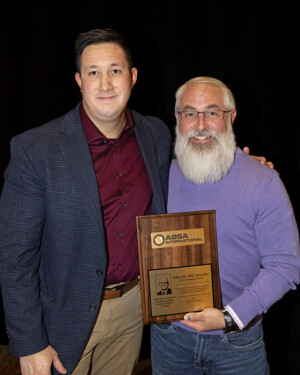 2024 Recipient: Jeffrey Potts, MPH, CBSP(ABSA)
2024 Recipient: Jeffrey Potts, MPH, CBSP(ABSA)
Jeff has been a quiet, steady influence on the biosafety profession, serving as mentor to NBBTP fellows, NIH co-editor of the 6th edition of Biosafety in Microbiological and Biomedical Laboratories (BMBL), and contributor to myriad Federal committees over the past two decades. His desire to find practical, performance-based solutions to biosafety issues rather than strict prescriptive measures has positively influenced a generation of NBBTP fellows and continued that tradition in the 6th edition of the BMBL. His voice on Federal councils and taskforces has similarly been one that advocated for both reasonable controls on high-risk experiments and agents, while allowing biosafety professionals to identify the means by which those controls would protect the public and allow the research to continue. After years of service at NIH, he now brings that expertise to the US Geological Service, overseeing their biosafety program and enhancing their ability to conduct field research safely. Jeff is one of the unsung heroes in our profession.
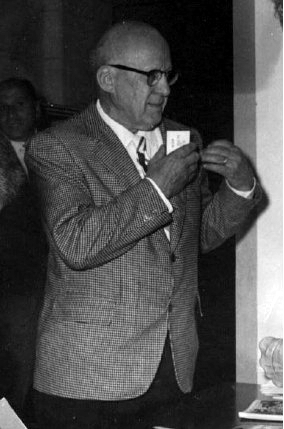
Arnold G. Wedum is revered as the person most responsible for creating the biosafety profession. He was a caring and wonderful mentor for many of the early leaders of ABSA. His traits of determination and persistence served biosafety well. He was one of the first to publish papers on how infectious aerosols were created in the lab and how to control those aerosols. He was a brilliant man whose knowledge of biological safety was sought by the leaders of the United State’s biological research community. The NIH Advisory Committee valued his council regarding safety practices appropriate to recombinant DNA research.
Dr. Wedum’s intellect, his deliberate and careful style in assessing hazards, and his vast experience remain instructive to all of us today. He brought to light the fundamental concepts of our profession. His lifelong efforts promoted occupational health and safety in infectious disease research and gave our profession credibility and a valid scientific relevance.
Everett Hanel, Jr. Presidential Award
The Everett Hanel, Jr. Presidential Award is given to a current ABSA member for outstanding contributions to ABSA International by promoting the field of biological safety and fostering, by example, the high professional standards of the Association’s membership.
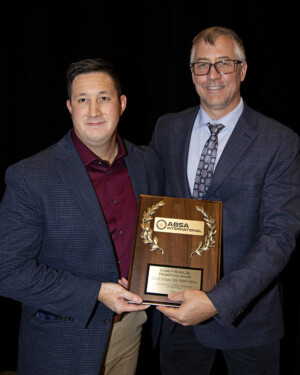 2024 Recipient: David Gillum, MS, RBP(ABSA)
2024 Recipient: David Gillum, MS, RBP(ABSA)
David began his career contributing to the field of biosafety at UMASS. These early career steppingstones working at UMASS EHS department were just scratching the surface towards his future efforts to mold and shape the field of biosafety.
Over the past 20 years David has made numerous outstanding contributions to ABSA. His deep commitment to support ABSA International during the COVID-19 pandemic included seamless transition to a virtual conference platform, COVID-19 toolbox and strategic planning to ensure both financial security and long-term sustainability.
David has served as an Associate Editor of Applied Biosafety for the past 10 years. He continues to demonstrate his leadership skills worldwide, through such events including participating in the Global Health Security Agenda (GHSA) meeting which highlighted ABSA’s active role on the global stage, the first biosafety judge for the International Genetically Engineered Machine (iGEM) (continuing for 6 years thereafter), continual partnership with the FBI including organizing the first International Biosecurity Workshop, and is a sought-after speaker at numerous international events. Most recently, David spoke at the Harvard Yale Symposium held at Harvard Medical School in April 2024 about his own research work on dual use research of concern and potential pandemic pathogens. He is a regular author in Editorials in Bulletin of the Atomic Scientists, Issues in Science and Technology, and The Conversation. David embodies all of the work of ABSA International and the profession of biosafety and biosecurity. He has had a profound impact on the biosafety and biosecurity profession and is a national and global leader in biosafety and biosecurity.
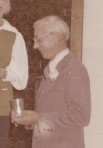
Everett Hanel, Jr. was a member of Dr. Wedum’s safety group at Fort Detrick from 1943-1972. Following his tenure there, he became the Director of the Health & Safety group at the National Cancer Institute in Frederick, MD. His efforts were central in the development and perpetuation of the Biological Safety Conference and the organization we know as ABSA. In 1983 Everett was chosen to be the first President of ABSA International. In recognition of his significant contribution to this organization throughout his lifetime career in biosafety, the Everett Hanel, Jr. Presidential Award was established in 1993.
John H. Richardson Special Recognition Award
The John H. Richardson Special Recognition Award was developed for, and shall be given to an individual, to recognize them for a specific contribution that has enhanced ABSA International and/or the profession of biosafety. The recipient must be a member of ABSA International.
2023 Recipient: Theodore Traum, PE
Theodore (Ted) Traum has demonstrated the importance of how biosafety and engineering must work together to ensure that high and maximum containment laboratories operate safely throughout the world. His biggest contribution to the profession of biosafety is sharing this knowledge. Ted has helped make it possible for research institutions and public health facilities throughout the world to comply with biosafety guidelines. His ability to teach personnel about engineering principles and how they impact their biocontainment laboratories has led to other regions being able to rely on their own local biosafety engineering experts, having the ability to commission, certify and verify their own high and maximum containment laboratories. Through Ted’s mentorship and training, professionals in countries outside of the United States, have a greater understanding of engineering principles and biosafety.
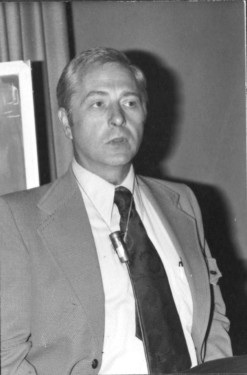
John H. Richardson was an early mentor and teacher of biological safety. He has been a prolific author of many biosafety articles as well a contributing author to many of our recognized guides to biosafety. Some of his contributory works are: coauthoring the 2nd edition of the Biosafety in Microbiological and Biomedical Laboratories (BMBL); contributing author to: Biosafety in the Laboratory: Prudent Practices for the Handling and Disposal of Infectious Materials (1989); contributing author to: Nonhuman Primates in Biomedical Research: Biology and Management (1995); as well as contributing author: Laboratory Safety: Principles and Practices, 2nd edition.
Diane Fleming Leadership Award
The Diane Fleming Award is given to a current ASBA member who exemplifies leadership within ABSA International and/or the biosafety and biosecurity profession. Leadership through mentoring new and established BSPs, service, collaboration with other professional organizations, publication, or teaching.
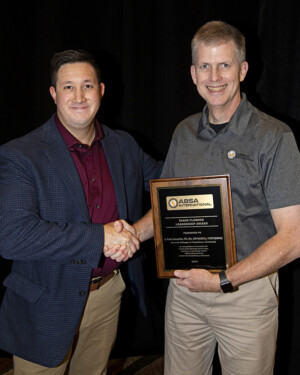 2023 Recipient: J. Paul Jennette, PE, MS, RBP(ABSA), CBSP(ABSA)
2023 Recipient: J. Paul Jennette, PE, MS, RBP(ABSA), CBSP(ABSA)
Paul has a passion for sharing his biosafety and engineering knowledge with others. With great enthusiasm, he can explain how an autoclave works, the dynamics of laboratory airflow, and how a HEPA filter traps different particles. A lot of people can talk to the technical aspects of these topics, but it takes someone who is seriously skilled in communication like Paul to explain these to non-engineers. As an ABSA representative on the ANSI Z9.14 Subcommittee on Testing and Performance-Verification Methodologies for Ventilation Systems for BSL-3 and ABSL-3 Facilities, he also helped shape the standard by which high containment laboratories are tested and has continued to advise the biosafety community on the application of the standard in the column, as well as through his contributions through training.
Paul’s dedication to teaching is also seen through his involvement with ABSA courses. Paul has taught 28 ABSA preconference courses on biocontainment laboratory fundamentals, operations, and management, with over 1,000 course participants. Paul is also an instructor for the ABSA Principles and Practices of Biosafety Course (PPB), a week-long training course for biosafety professionals who are new to the field. The quality of Paul’s instruction is even more deserving of recognition as Paul is the type of instructor we all aspire to be. His influence does not stop in the classroom as he continues to advise and mentor students long after the course is over via countless emails, phone calls, and in-person meetings. Paul is willing and even eager to provide mentorship to new and experienced biosafety professionals alike. His love for the profession and the nexus between biosafety and facility operations are apparent and contagious. He is one of very few who can marry biosafety and containment facility operations so well, which has become such a critical part of our practice with increasing integration of technology in facility engineering and controls. We appreciate his devotion to the biosafety community over the last twenty years.
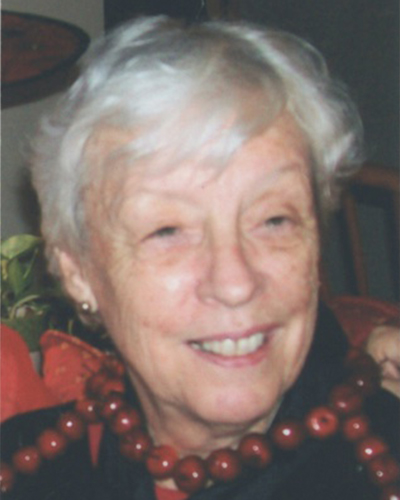
Diane Fleming served as ABSA President, served on the Ethics, Nominating, and Technical Review Committees. Her position in Biosafety at Frederick Cancer Research Facility(FCRC) in Ft. Detrick, MD provided the opportunity to mentor many who were interested in the field of biological safety. At FCRC she was able to hire three young women who went on to make their careers in biosafety.
Diane served on the committee which drew up the questions for the first ASM test for biosafety professional certification (CBSP Exam) and was an integral part of the creation of the ABSA Certification Committee (currently the Credentialing Maintenance Board). Diane demonstrated leadership through editing and recruiting authors for the Biological Safety: Principles and Practices and was instrumental in using her ASM ties to collaborate with ABSA members to advance risk assessment.
Dr. Fleming taught anatomy, biology. genetics, microbiology, medical microbiology and Laboratory Safety and Health while serving as an Instructor, Staff Tutor or Assistant Professor on the faculty of Memphis State University, Central Texas College Europe, The Open University (England), University of Maryland Europe, Sinclair Community College, OH, Wright State University School of Medicine, and The Johns Hopkins School of Medicine and School of Hygiene and Public Health. She also taught various aspects of biological safety in pre-conference workshops and given platform presentations for ABSA and ASM.
Annual Recognition Awards
The Hashimoto Service Award
The Hashimoto Recognition Award recognizes outstanding service to an ABSA committee or Task Force.
2024 Recipients:
Sepideh Hockley – Local Arrangements Committee
John Balog – Awards Committee
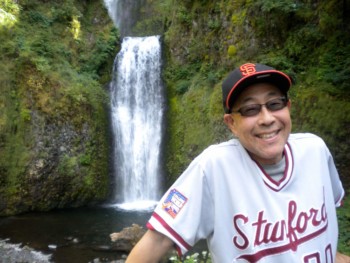
The award was created in honor of Robert Hashimoto, MS, RBP CBSP, SM (NRCM). Bob had a long history of service and leadership within ABSA International as well as during his 26 year career as a Biosafety Officer. He was a mentor to countless biosafety professionals and a friend to even more.
Eagleson Lecture Series Award
2024 Recipient: David Engelthaler, PhD
Translational Genomics Research Institute and Health Observatory at ASU, Phoenix, AZ
Advancing Health Knowledge with Pathogen Intelligence
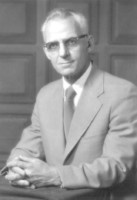
The Eagleson Lecture is in memory of John M. Eagleson, Jr. The keynote speaker for the Biological Safety Conference shall be the speaker that is sponsored by the Eagleson Institute. The Eagleson Lecture Series Award recipient is selected in recognition of accomplishments that contribute to the awareness of biological hazards. The topic of the lecture shall be consistent with the mission of the Eagleson Institute, which is to promote the principles and practices of laboratory safety. The subject of the lecture shall be timely with an emphasis on emerging issues rather than the presentation of historical information. The Scientific Program Committee (SPC) shall recommend nominees to the Eagleson Institute for selection.
E. R. Griffin Lecture Series Award
The E. R. Griffin Lecture Series Award recipient is selected in recognition of accomplishments that contribute to the awareness of biological and occupational safety. The topic of the lecture shall be consistent with the mission of the Foundation, which is to promote the safe research practices and help fund further research in the areas of zoonotic diseases.
2024 Recipient: Djibril Sangaré, PhD, Malaria Research and Training Center (MRTC), Bamako, Mali
Strengthening National and Regional Collaboration for Laboratory Biorisk Management in Mali and Across West and Central Africa
In 2018, the Elizabeth R. Griffin Research Foundation selected Georgetown University to advance its research and education missions, launching a new era as the Elizabeth R. Griffin Program (ERG). ERG at Georgetown builds on the 20-year legacy of the Foundation’s work and the Georgetown University Medical Center’s mission of excellence in research, education, and the improvement of human health and well-being.
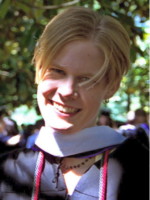
The ERG Program works to enhance and sustain leadership in the expanding field of global health science and security. Through collaborative research, training, and education, ERG at Georgetown promotes evidence-based biosafety and biosecurity practices to protect the health and safety of researchers as well as the workers on the front lines of disease detection around the world.
Robert I. Gross Student Award
This is awarded to a student in recognition of academic achievement in biological safety. The award provides a grant to a student to register, attend, and present a technical paper or poster at the annual conference. The student must be in a degree granting program at the baccalaureate or graduate level in an academic discipline or field that is relevant to biosafety. Membership in ABSA is not required. The Scientific Program Committee selects the grant recipient from among the student applicants who submit abstracts.
2024 Recipient: Iris Magne, London Metropolitan University, London, England
International Biosecurity Education Network: A Timely Tool for Biosecurity
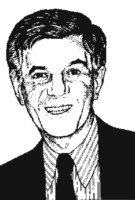
The Robert I. Gross Memorial Fund was established in 1991 with the receipt of a gift from Marsha Gross in memory of Robert I. Gross.
Richard C. Knudsen Publication Award
The Richard C. Knudsen Publication Award shall be given, when merited, to the author(s) of an article that reports a significant contribution in scientific investigation and/or health and safety, whether the authors are members or not of the Association. The article shall have been published in Applied Biosafety the year preceding the award. The nomination for this award is made by a committee formed by two members of the Publications Committee as well as two members of the Awards Committee.
2024: Alan Beswick, PhD, Health and Safety Executive Science and Research Centre, Buxton, United Kingdom
An Assessment of Germicidal Ultraviolet Treatment Cabinets and Carousels Using a Bacteriophage Surface Challenge
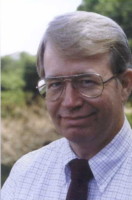
Richard C. Knudsen did his post-doctoral studies through the National Institute of Health and the National Research Council. He became an immunologist at the Naval Medical Research facility in Bethesda, Md. In 1976, he studied swine flu virus for the USDA. Ten years later, he moved to the Plum Island Animal Disease Center and later became chief of laboratory safety at the Centers for Disease Control. Dr. Knudsen was a prolific writer and had articles published in the Journal of Bacteriology; Journal of Virological Methods; Journal of Experimental Medicine; Journal of General Virology; Journal of Immunology; Journal of Immunological Methods; and Applied Microbiology to name but a few. He assisted with the preparation of the Interim Biosafety Guidelines for Hantavirus Pulmonary Syndrome. He also finalized a plan that reflected the views of the U.S. Department of Transportation and CDC. This document proposed that U.S. diagnostic specimen shipments should be regulated and that diagnostic specimen shipments using air transportation should be required to meet the standards of IATA Packing Instruction 650.
Arnold G. Wedum Memorial Lecture Award
Established in 1976 to honor the memory of the man who is considered the “Father of Biosafety,” this award is given to an outstanding scientist or biological safety professional whose work has contributed to a better understanding of the occupational or environmental risks associated with infectious agents or biologically-derived materials, or whose contribution has led to the development of improved control methods in minimizing those risks.
The recipient is not required to be a member of ABSA. Candidates for the award will be chosen by the Scientific Program Committee and recommended to the Council for approval.
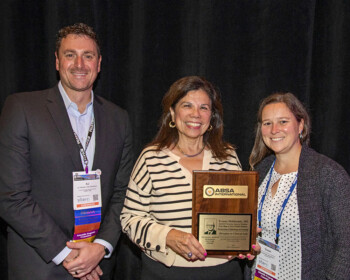 2024 Recipient: Yvonne (Bonnie) Maldonado, MD, Stanford University School of Medicine, Palo Alto, CA
2024 Recipient: Yvonne (Bonnie) Maldonado, MD, Stanford University School of Medicine, Palo Alto, CA
From a House on Fire to a World in Shutdown: The Intersection of Epidemiology and Vaccinology
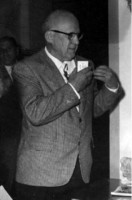
Arnold G. Wedum is revered as the person most responsible for creating the biosafety profession. He was a caring and wonderful mentor for many of the early leaders of ABSA. His traits of determination and persistence served biosafety well. He was one of the first to publish papers on how infectious aerosols were created in the lab and how to control those aerosols. He was a brilliant man whose knowledge of biological safety was sought by the leaders of the United State’s biological research community. The NIH Advisory Committee valued his council regarding safety practices appropriate to recombinant DNA research.
Dr. Wedum’s intellect, his deliberate and careful style in assessing hazards, and his vast experience remain instructive to all of us today. He brought to light the fundamental concepts of our profession. His lifelong efforts promoted occupational health and safety in infectious disease research and gave our profession credibility and a valid scientific relevance.
image sources
- bioawardagw: Owned by the author
- bioawardehsm: Owned by the author
- bioawardjhr: Owned by the author
- bob_hash: Owned by the author
- bioawardeag: Owned by the author
- bioawardgriffin: ERG Research Foundation
- bioawardrig: Owned by the author
- bioawardrck: Owned by the author


